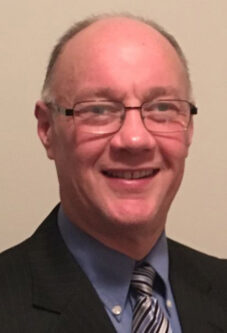Group publisher recounts struggle with kidney disease
By Lethbridge Herald on April 7, 2022.
 Ryan McAdams
Group Publisher, Southern Alberta Newspapers
Ryan McAdams
Group Publisher, Southern Alberta NewspapersTrevor Busch
Lethbridge Herald
It was just an ordinary trip to the doctor for Ryan McAdams.
Back in 2011 McAdams wasn’t experiencing any serious health problems, but when he got a follow up call from his doctor he immediately jumped to conclusions. But it turns out he was well off the mark in his amateur diagnosis.
“I never knew there was something wrong. I went for a routine check-up back in 2011 and got a phone call from the doctor’s office a couple of days later…that’s not usually a good thing, and the first thing my mind went to was cancer. I don’t know why I thought that, but it’s what I remember thinking. So I went in the next day, and she said I’ve got you set up with an appointment with a nephrologist. I said, ‘What’s that? I know what a psychologist is, I know what a optometrist is, but a nephrologist what is that?'”
“She said, ‘It’s a kidney specialist’.”
His doctor explained he was displaying some warning signs for kidney disease. After seeing a specialist, going through a battery of tests and an exploration of some family medical history, McAdams was diagnosed with polycystic kidney disease.
McAdams is the general manager for Southern Alberta Newspapers, which includes the Lethbridge Herald, Medicine Hat News and various weekly newspapers throughout the region.
In his early 50s at the time he received his diagnosis, McAdams had no symptoms initially and it was determined that his kidney function was still pretty good at around 42-45 per cent. But he knew he needed to make some lifestyle changes — get more exercise, lose weight, eat better and eat less, and avoid kidney-challenging foods — anything to mitigate his loss of kidney function and delay dialysis or the eventual need for a transplant.
“He said if you take care of it, you can stretch this out for 5-10 years — so I did what I could.”
McAdams took the advice to heart, initially targeting weight loss, and was eventually able to drop 115 pounds.
“That really helped me slow down the progression. I was losing between 2-3 per cent (of kidney function) per year for the first two or three years. By May 2012 I was down to 215 pounds.”
Despite making important lifestyle changes, McAdams’ kidney function continued to incrementally decline. After moving to Lethbridge in 2016, his kidney function began deteriorating more rapidly, and it was getting down to decision time.
“I went from the low 30s down to around 20 per cent in a couple of years. So it was starting to escalate then. So I asked the doctor, when should I go on dialysis? And he said, ‘Well, you’ll tell me.’ I said what do you mean? I thought you were the doctor. He said I’m not going to let you get dangerously ill or put yourself in jeopardy, but I want you to be the judge of when you start dialysis.”
After holding out for a few more years, McAdams started peritoneal dialysis in September 2019, initially at home. But there were some complications, and McAdams was eventually forced to begin hemodialysis, four hours three times weekly.
After more tests and consultation, McAdams was eventually placed on the active transplant list in July 2021.
“So that’s where I sit right now, waiting for that phone call. It’s frustrating – last July I was told I could get a phone call at any time. So I said what do you mean by that? She said the best way I can put it to you is, do you sleep with your cellphone ringer on or off? I said off, I don’t want calls at night. She said you need to change that, because a call can come at any time.”
While he is happy to now be on the list, the waiting game has its own negative implications.
“It’s getting to the point now where it’s demoralizing. We’re going on months since the call could come at any time, still no call. It’s one of those things where dialysis is the only option — it’s not great but its better than the third option, which is say goodnight.”
Over the years, the disease has taken its toll not just on McAdams’ personal health, but on his family and those around him.
“It has, no question. It’s an additional burden on my wife, she can only do so much. My energy level is very low, depending on where I am at in my dialysis cycle, depending on how I’ve been taking care of myself, how much sleep I’m getting. There’s a lot of little things I just can’t do anymore. There’s no gas in the tank, I’m running on empty. A lot of it is mental as well, such as the stress level.”
Today, he is still waiting on a kidney transplant call at any time. But McAdams has learned that when something affects you personally, it can be a catalyst for changing opinions and attitudes in your own life.
“With organ donation if you can’t take them with you, help someone else. I’m not suggesting that everyone has to have the same philosophical perspective, but it’s one of those things where if you know someone that is going through this, your mind changes.”
<5 1 Comment
Oldest




